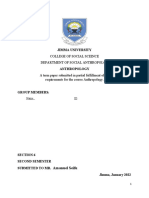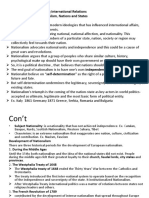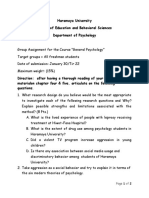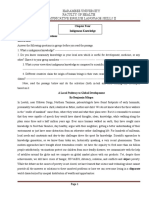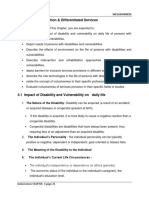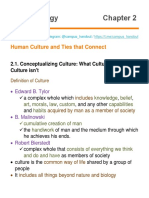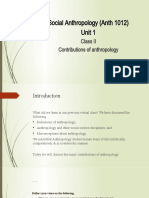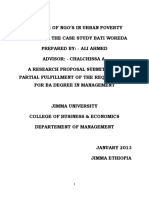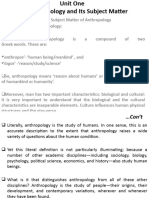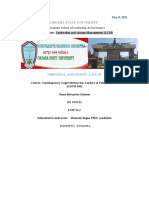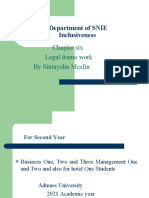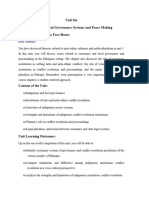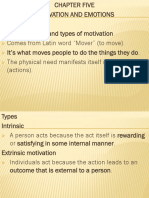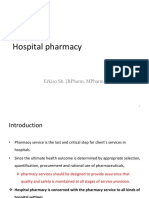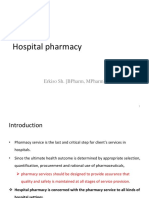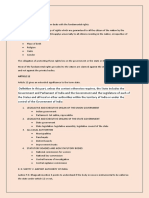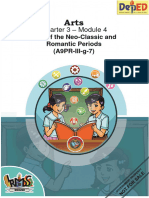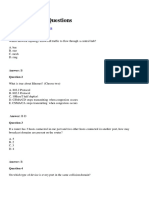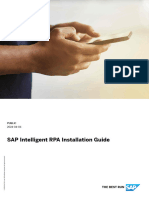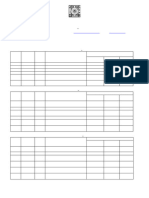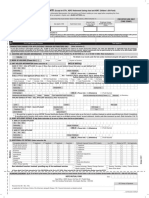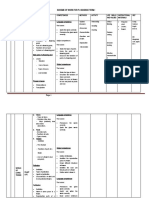0%(1)0% found this document useful (1 vote)
429 viewsPsych 8
Psych 8
Uploaded by
ekramThis document discusses life skills and their importance. It defines life skills as abilities that allow individuals to effectively deal with everyday challenges according to the WHO. Key life skills components discussed include critical thinking, self-confidence, self-awareness, decision making, and interpersonal relationships. The goals of developing life skills are to help individuals lead successful lives through lessening negative behaviors, increasing prosocial behaviors, improving self-image and emotional adjustment, and gaining knowledge and self-control.
Copyright:
© All Rights Reserved
Available Formats
Download as PPTX, PDF, TXT or read online from Scribd
Psych 8
Psych 8
Uploaded by
ekram0%(1)0% found this document useful (1 vote)
429 views5 pagesThis document discusses life skills and their importance. It defines life skills as abilities that allow individuals to effectively deal with everyday challenges according to the WHO. Key life skills components discussed include critical thinking, self-confidence, self-awareness, decision making, and interpersonal relationships. The goals of developing life skills are to help individuals lead successful lives through lessening negative behaviors, increasing prosocial behaviors, improving self-image and emotional adjustment, and gaining knowledge and self-control.
Original Title
psych8
Copyright
© © All Rights Reserved
Available Formats
PPTX, PDF, TXT or read online from Scribd
Share this document
Did you find this document useful?
Is this content inappropriate?
This document discusses life skills and their importance. It defines life skills as abilities that allow individuals to effectively deal with everyday challenges according to the WHO. Key life skills components discussed include critical thinking, self-confidence, self-awareness, decision making, and interpersonal relationships. The goals of developing life skills are to help individuals lead successful lives through lessening negative behaviors, increasing prosocial behaviors, improving self-image and emotional adjustment, and gaining knowledge and self-control.
Copyright:
© All Rights Reserved
Available Formats
Download as PPTX, PDF, TXT or read online from Scribd
Download as pptx, pdf, or txt
0%(1)0% found this document useful (1 vote)
429 views5 pagesPsych 8
Psych 8
Uploaded by
ekramThis document discusses life skills and their importance. It defines life skills as abilities that allow individuals to effectively deal with everyday challenges according to the WHO. Key life skills components discussed include critical thinking, self-confidence, self-awareness, decision making, and interpersonal relationships. The goals of developing life skills are to help individuals lead successful lives through lessening negative behaviors, increasing prosocial behaviors, improving self-image and emotional adjustment, and gaining knowledge and self-control.
Copyright:
© All Rights Reserved
Available Formats
Download as PPTX, PDF, TXT or read online from Scribd
Download as pptx, pdf, or txt
You are on page 1of 5
CHAPTER EIGHT
INTRODUCTION TO LIFE SKILLS
8.1. Nature and Definition of Life skills
“Abilities for adaptive and positive behavior that
enable individuals to deal effectively with the
demands and challenges of everyday life.” (WHO).
“Behavioral changes or behavioral development
approach designed to address a balance of three
areas: knowledge, attitude, and skills”
(UNICEF’s).
The abilities help to promote mental well-being
and competence in young people as they face the
realities of life.
8.2. Components of Life Skills
Critical thinking
Thinking more effectively within curricular subject areas,
understanding the reasoning employed, assessing
independently and appropriately, and solving problems
effectively.
Also involves improved thinking skills in dealing with real life
problems-in assessing information and arguments in social
contexts and making life decisions.
Self-confidence
Individual’s trust in his or her own abilities, capacities, and
judgments.
Self-awareness
It is the quality or trait that involves conscious awareness of
one’s own thoughts, feelings, and behaviors
Self-concept
Incorporates traits, preferences, values, beliefs, and interests
the person believes to be true about himself/herself.
Self-esteem
The degree to which we perceive ourselves
positively or negatively
Our overall attitude toward ourselves, which can
be measured explicitly or implicitly.
Decision-making
Combining and integrating available information
to choose, implement, and evaluate one out of
several possible courses of actions.
Interpersonal relationships
Social associations, connections, or affiliations
between two or more people having various levels
of intimacy and sharing, and implying the
discovery or establishment of common ground.
Reflective communication
Attending communications with thoughtful and
due attention to reflect on one’s own thinking,
behaviors and interaction with others.
Peers pressure resistance
Individual’s abilities and skills to confront
negative influences from his/her group members.
Knowing rights and duties
One’s knowledge and understanding of rights and
duties of individuals, groups, institutions and
nations allowed to do or not to do by law and/or a
culture.
8.3. Goals of Life Skills
Knowing and applying life skills is to lead smooth and
successful life at home, work place, and in social
interpersonal relationship.
Lessened violent behavior;
Increased pro-social behavior
Decreased negative, self-destructive behavior;
Increased the ability to plan ahead and choose effective
solutions to problems;
Improved self-image, self-awareness, social and emotional
adjustment;
Increased acquisition of knowledge;
Improved classroom behavior;
Gains in self control and handling of interpersonal
problems and coping with anxiety; and
Improved constructive conflict resolution with peers,
impulse control and popularity.
You might also like
- Road To Royalty by Cheryl ZeeDocument469 pagesRoad To Royalty by Cheryl Zeekrcxpgsb47No ratings yet
- Pharmacotherapy A Pathophysiologic Appro PDFDocument3 pagesPharmacotherapy A Pathophysiologic Appro PDFekram0% (2)
- Business Etiquette Question BankDocument10 pagesBusiness Etiquette Question Bankharpominder80% (5)
- Inclusiveness - PPT - Chapter 1-3Document220 pagesInclusiveness - PPT - Chapter 1-3ezakbelachewNo ratings yet
- Antrhopology Group AssigmentDocument9 pagesAntrhopology Group AssigmentDagim Abreham100% (3)
- Freshman Eco Unit 5Document16 pagesFreshman Eco Unit 5Khant Si ThuNo ratings yet
- Global Trends Unit 1-4Document137 pagesGlobal Trends Unit 1-4zekarias wondafrashNo ratings yet
- Anthropology 1012, Unit 3,4,5Document163 pagesAnthropology 1012, Unit 3,4,5Abdulmejd Kelil Shifa (Techkelster)No ratings yet
- Chapter One Logic Short NoteDocument54 pagesChapter One Logic Short NoteBereketNo ratings yet
- 1 Moral and CitizenshipDocument15 pages1 Moral and CitizenshipEliasNo ratings yet
- Moral and Citizenship Education (Mced 1011) : Prepared byDocument198 pagesMoral and Citizenship Education (Mced 1011) : Prepared byHENOK MNo ratings yet
- Chapter 2 - Concept of InclusionDocument27 pagesChapter 2 - Concept of InclusionNaol Zeleke100% (2)
- Brief Notes For Communicative English IIDocument16 pagesBrief Notes For Communicative English IITofik MohammedNo ratings yet
- Inclusiveness Crush Proggram ModuleDocument68 pagesInclusiveness Crush Proggram Moduleezedin ahmed0% (1)
- Global Trends: Major Contemporary Global Issues By: Asferachew D. DDocument27 pagesGlobal Trends: Major Contemporary Global Issues By: Asferachew D. DMohammedNo ratings yet
- Chapter One: Understanding International Relations 1.1. Conceptualizing Nationalism, Nations and States NationalismDocument4 pagesChapter One: Understanding International Relations 1.1. Conceptualizing Nationalism, Nations and States NationalismgebregziabherNo ratings yet
- Freshman-General Psych Assignment FinalDocument2 pagesFreshman-General Psych Assignment FinalOROM VINE100% (3)
- Anthropology Chapter 2Document58 pagesAnthropology Chapter 2shambel derbeba100% (1)
- Addis Ababa University College of Education and Behavioral Studies Department of Special Needs EducationDocument24 pagesAddis Ababa University College of Education and Behavioral Studies Department of Special Needs EducationTinsae Assefa100% (1)
- Social Anthropology Group AssignmentDocument6 pagesSocial Anthropology Group AssignmentKidus Seleshi100% (1)
- Chapter 4 InclusivenessDocument25 pagesChapter 4 InclusivenessNaol Ejara100% (1)
- Chapter Four: Basic Concepts and Principles of Critical ThinkingDocument17 pagesChapter Four: Basic Concepts and Principles of Critical ThinkingSemir100% (2)
- Moral and Civic Education PPT 2020Document248 pagesMoral and Civic Education PPT 2020feyera gNo ratings yet
- Summary of Life SkillsDocument2 pagesSummary of Life SkillsMelese Aschalew100% (1)
- Commu. II UNIT 4Document9 pagesCommu. II UNIT 4bashaNo ratings yet
- Anthro CH 5Document18 pagesAnthro CH 5Lee Hailu0% (1)
- Anth 1012, Units 4-6, Revised, Post-Covid, Jan. 2021Document86 pagesAnth 1012, Units 4-6, Revised, Post-Covid, Jan. 2021Abdulmejd Kelil Shifa (Techkelster)No ratings yet
- InclusivenessDocument91 pagesInclusivenessMelaku Walelgne100% (2)
- Chapter One: Introduction To Foreign Policy and DiplomacyDocument22 pagesChapter One: Introduction To Foreign Policy and DiplomacyDiriba DinkuNo ratings yet
- Welcome!: CollegeDocument30 pagesWelcome!: CollegeRobera100% (1)
- Chapter Four: Basic Concepts and Principles of Critical ThinkingDocument8 pagesChapter Four: Basic Concepts and Principles of Critical ThinkingSemir100% (1)
- Inclusiveness Chapter - 3Document14 pagesInclusiveness Chapter - 3SKY Stationery100% (2)
- Anthropology Chap 2 DraftDocument14 pagesAnthropology Chap 2 DraftKedir67% (3)
- Chapter 3 - Identifications of Impacts of DisabilityDocument41 pagesChapter 3 - Identifications of Impacts of DisabilityNaol Zeleke100% (1)
- Anth 1012-Unit 1 - Class II Sep 10Document13 pagesAnth 1012-Unit 1 - Class II Sep 10EYOBNo ratings yet
- CH 3Document26 pagesCH 3Alemayehu gabisaNo ratings yet
- The Role NgoDocument25 pagesThe Role Ngogetacher tadeg0% (1)
- Freshman Maths Teacher GuideDocument89 pagesFreshman Maths Teacher GuideAbnet GedamuNo ratings yet
- Social Anthropology Unit OneDocument37 pagesSocial Anthropology Unit OneEarmias GumanteNo ratings yet
- BDU Inclusiveness PowerPoint ExamClassDocument171 pagesBDU Inclusiveness PowerPoint ExamClassteshomegeleta891No ratings yet
- Moral Citizenship Education: MCED 1012)Document70 pagesMoral Citizenship Education: MCED 1012)Daniel Yirdaw100% (1)
- Civics PPT 1-2Document49 pagesCivics PPT 1-2Mengistu Animaw100% (1)
- Global Trends - PPT - Chapter 3Document19 pagesGlobal Trends - PPT - Chapter 3workinehamanuNo ratings yet
- Anthropology 1000 Final Exam ReviewDocument5 pagesAnthropology 1000 Final Exam ReviewFrozenIpaq100% (2)
- Oromia State University: Specialization: Leadership and Change Management (LCM)Document19 pagesOromia State University: Specialization: Leadership and Change Management (LCM)Missael Ayalew100% (1)
- Freshman Geography Lecture 1Document40 pagesFreshman Geography Lecture 1hanataye37No ratings yet
- Chapter FourDocument31 pagesChapter FourWayyeessaa MargaaNo ratings yet
- Chapter Four: State, Government and CitizenshipDocument107 pagesChapter Four: State, Government and Citizenshipyohannes lemi100% (1)
- Civic and Ethical EducationDocument98 pagesCivic and Ethical Educationmustafe ABDULLAHINo ratings yet
- Chapter Two-Foundation of Individual Behavior and Learning in An OrganizationDocument16 pagesChapter Two-Foundation of Individual Behavior and Learning in An OrganizationMikias DegwaleNo ratings yet
- BC PowerPoint PresentationDocument164 pagesBC PowerPoint PresentationMelkamu TuchamoNo ratings yet
- Global Trends Chap 4 (Part One) - Premium OnlyDocument7 pagesGlobal Trends Chap 4 (Part One) - Premium OnlyNatnael TafesseNo ratings yet
- Department of SNIE Inclusiveness: Chapter Six Legal Frame Work by Sintayehu MesfinDocument18 pagesDepartment of SNIE Inclusiveness: Chapter Six Legal Frame Work by Sintayehu MesfinNahh100% (2)
- Chapter FiveDocument9 pagesChapter Fivedawit100% (1)
- Anth. Chap4Document12 pagesAnth. Chap4ananiya kassayeNo ratings yet
- AAU Civic and Ethical Education AssignmentDocument16 pagesAAU Civic and Ethical Education AssignmentnahNo ratings yet
- Global Trends Chapter 1Document16 pagesGlobal Trends Chapter 1FishNo ratings yet
- Hamar EthnographyDocument13 pagesHamar Ethnographyapi-438461217100% (1)
- Understanding Civics, Ethics and Morality: Chapter OneDocument82 pagesUnderstanding Civics, Ethics and Morality: Chapter Oneamanu kassahun100% (3)
- Ministry of Science and Higher Education: Social Anthropology (Anth 1012)Document30 pagesMinistry of Science and Higher Education: Social Anthropology (Anth 1012)Natty Nigussie100% (1)
- Unit Six 6. Customary and Local Governance Systems and Peace Making Study Hours: 8 Face To Face HoursDocument39 pagesUnit Six 6. Customary and Local Governance Systems and Peace Making Study Hours: 8 Face To Face Hourstegenetariku63100% (1)
- Introduction To Ethiopian Geography and The HornDocument63 pagesIntroduction To Ethiopian Geography and The HornAbel TayeNo ratings yet
- Psycho5 1Document16 pagesPsycho5 1ekramNo ratings yet
- Critical Chapter 5Document64 pagesCritical Chapter 5ekram100% (1)
- Warfarin Drug MonographDocument1 pageWarfarin Drug Monographekram100% (1)
- Critical Chapter 5Document64 pagesCritical Chapter 5ekram100% (1)
- WarfarinDocument4 pagesWarfarinekramNo ratings yet
- Ethiopian Grade 11 Civics and Ethical Education Student Textbook PDFDocument148 pagesEthiopian Grade 11 Civics and Ethical Education Student Textbook PDFekram81% (74)
- FILTRATIONDocument35 pagesFILTRATIONekram100% (2)
- JointDocument2 pagesJointekramNo ratings yet
- Drug MonographDocument7 pagesDrug Monographekram100% (1)
- 3A - Hospital PharmacyDocument13 pages3A - Hospital PharmacyekramNo ratings yet
- Culture Refers To The Cumulative Deposit of KnowledgeDocument3 pagesCulture Refers To The Cumulative Deposit of KnowledgeRichel Madara NideaNo ratings yet
- 3A - Hospital PharmacyDocument13 pages3A - Hospital PharmacyekramNo ratings yet
- 3B - Clinical PharmacyDocument35 pages3B - Clinical PharmacyekramNo ratings yet
- 3B - Clinical PharmacyDocument35 pages3B - Clinical PharmacyekramNo ratings yet
- 1-An Overview of Community PharmacyDocument55 pages1-An Overview of Community PharmacyekramNo ratings yet
- 3C DTCDocument40 pages3C DTCekramNo ratings yet
- Industrial Pharmacy AssignmentDocument1 pageIndustrial Pharmacy AssignmentekramNo ratings yet
- 1 - Pharmaceutical Care Practice - An OverviewDocument76 pages1 - Pharmaceutical Care Practice - An Overviewekram100% (1)
- GMP FinalDocument37 pagesGMP FinalekramNo ratings yet
- 3A - Hospital PharmacyDocument13 pages3A - Hospital PharmacyekramNo ratings yet
- ABIDocument27 pagesABIekramNo ratings yet
- 3A - Hospital PharmacyDocument13 pages3A - Hospital PharmacyekramNo ratings yet
- 3C DTCDocument40 pages3C DTCekramNo ratings yet
- AMANDA GUMEDE Vs TRUSTEES OF HONEY VIEW BODY CORPORATE 25 June 2023Document22 pagesAMANDA GUMEDE Vs TRUSTEES OF HONEY VIEW BODY CORPORATE 25 June 2023pvtNo ratings yet
- Final Coaching Sept 2023Document5 pagesFinal Coaching Sept 2023Gerland Gregorio EsmedinaNo ratings yet
- Heroic Challenges - Core Set ChallengesDocument54 pagesHeroic Challenges - Core Set ChallengesyarikrishnaNo ratings yet
- Cecilia Manguerra BrainardDocument8 pagesCecilia Manguerra BrainardLorry DoronNo ratings yet
- Consti Word NoteDocument10 pagesConsti Word NoteAnna davisNo ratings yet
- 3-Science & Technology and Nation-BuildingDocument3 pages3-Science & Technology and Nation-BuildingMaryjane TesingNo ratings yet
- Biodata Dr. P. Sirohi - 2021.06.16Document10 pagesBiodata Dr. P. Sirohi - 2021.06.16kvpy iisc bangloreNo ratings yet
- Arts9 Q3 Mod4Document24 pagesArts9 Q3 Mod4edel dearce IIINo ratings yet
- Training Session Evaluation Form Instructions:: Gaton RanciaDocument5 pagesTraining Session Evaluation Form Instructions:: Gaton RanciaEvander Renz Adolfo AngNo ratings yet
- CCNAquestions Jun 2017 BoraDocument152 pagesCCNAquestions Jun 2017 BoraJesus RosalesNo ratings yet
- The Microwave Multifunctional Tissue Processor You Were Waiting For. You Were Waiting ForDocument6 pagesThe Microwave Multifunctional Tissue Processor You Were Waiting For. You Were Waiting ForDavid MuñozNo ratings yet
- Complete The Sentences With Either Or, Both and or Neither NorDocument5 pagesComplete The Sentences With Either Or, Both and or Neither NorPhương AnhNo ratings yet
- ImmunizationDocument18 pagesImmunizationDushyant MudgalNo ratings yet
- Culture and Power in The ClassroomDocument227 pagesCulture and Power in The ClassroomLoren MartinezNo ratings yet
- Guide RpaDocument70 pagesGuide RpaflavioNo ratings yet
- XII - Important Questions 2022-23 FinalDocument4 pagesXII - Important Questions 2022-23 FinalRani muthuselvamNo ratings yet
- Complete Cbcs Pol SC SyllabyusDocument13 pagesComplete Cbcs Pol SC Syllabyussujanjana008No ratings yet
- Upgrade Fails When User-Defined Field Is Defined On TableDocument3 pagesUpgrade Fails When User-Defined Field Is Defined On TableDant NazarNo ratings yet
- Schedule For Sand BlastingDocument2 pagesSchedule For Sand BlastingPratik GurungNo ratings yet
- Your E-Admit CardDocument4 pagesYour E-Admit Cardrudrans.npt.02No ratings yet
- HDFC CafDocument3 pagesHDFC CafSachin JamaiyarNo ratings yet
- Pre Release Movie Marketing The Latest Buzz: Amruta DeshmukhDocument19 pagesPre Release Movie Marketing The Latest Buzz: Amruta Deshmukhdarshan1793No ratings yet
- 10 p2t Tls Yr2 ScienceDocument10 pages10 p2t Tls Yr2 Sciencemilie.chauhan97No ratings yet
- Arbitrage Strategies PaperDocument39 pagesArbitrage Strategies PaperAditya JadhavNo ratings yet
- Scheme of Work For P.4 Science Term IDocument20 pagesScheme of Work For P.4 Science Term IWangolo Kisa86% (7)
- FS Chapter 1 Group 5Document7 pagesFS Chapter 1 Group 5Franxis YlardexNo ratings yet
- Transphobia in Society Draft 1Document5 pagesTransphobia in Society Draft 1api-300348577No ratings yet
- Test 5 Chuyên Anh Bình Phư C 2022-2023Document7 pagesTest 5 Chuyên Anh Bình Phư C 2022-2023Hiền NgôNo ratings yet




